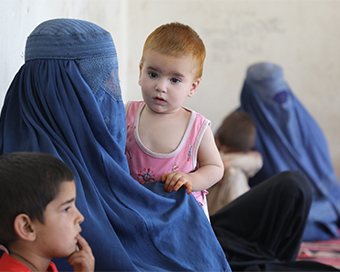Gallery
 PM Modi visit USA
PM Modi visit USA Only the mirror in my washroom and phone gallery see the crazy me : Sara Khan
Only the mirror in my washroom and phone gallery see the crazy me : Sara Khan Karnataka rain fury: Photos of flooded streets, uprooted trees
Karnataka rain fury: Photos of flooded streets, uprooted trees Cannes 2022: Deepika Padukone stuns at the French Riviera in Sabyasachi outfit
Cannes 2022: Deepika Padukone stuns at the French Riviera in Sabyasachi outfit Ranbir Kapoor And Alia Bhatt's Wedding Pics - Sealed With A Kiss
Ranbir Kapoor And Alia Bhatt's Wedding Pics - Sealed With A Kiss Oscars 2022: Every Academy Award Winner
Oscars 2022: Every Academy Award Winner Shane Warne (1969-2022): Australian cricket legend's life in pictures
Shane Warne (1969-2022): Australian cricket legend's life in pictures Photos: What Russia's invasion of Ukraine looks like on the ground
Photos: What Russia's invasion of Ukraine looks like on the ground Lata Mangeshkar (1929-2022): A pictorial tribute to the 'Nightingale of India'
Lata Mangeshkar (1929-2022): A pictorial tribute to the 'Nightingale of India' PM Modi unveils 216-feet tall Statue of Equality in Hyderabad (PHOTOS)
PM Modi unveils 216-feet tall Statue of Equality in Hyderabad (PHOTOS)The Badminton Association of India (BAI) has announced a 14-member-strong India squad for
- Men’s Sr Hockey Nationals to be played in division-based format from April 4
- Mensik denies Djokovic 100th title in Miami final
- KIPG: Son of a vegetable vendor, Bihar’s Jhandu Kumar eyes Worlds, 2028 Paralympics
- Hardik Singh credits hard work and team unity for receiving HI Midfielder of the Year award
- Djokovic, Alcaraz land in same half of Miami draw
Afghan baby girls as young as 20 days are being offered up for marriage in return for dowry: UNICEF Last Updated : 13 Nov 2021 05:59:36 PM IST 
UNICEF Executive Director Henrietta Fore has said that there is deep concern over reports that child marriages in Afghanistan are on the rise.
"We have received credible reports of families offering daughters as young as 20 days old for future marriage in return for dowry," Fore said.Even before the latest political instability in Afghanistan, UNICEF's partners registered 183 child marriages and 10 cases of selling of children over 2018 and 2019 in Herat and Baghdis provinces alone. The children were between 6 months and 17 years of age. UNICEF estimates that 28 per cent of Afghan women aged 15-49 years were married before the age of 18.The Covid-19 pandemic, the ongoing food crisis and the onset of winter have further exacerbated the situation for Afghan families. In 2020, almost half of Afghanistan's population was so poor that they lacked necessities such as basic nutrition or clean water."The extremely dire economic situation in Afghanistan is pushing more families deeper into poverty and forcing them to make desperate choices, such as putting children to work and marrying girls off at a young age," UNICEF said in a statement."As most teenage girls are still not allowed to go back to school, the risk of child marriage is now even higher. Education is often the best protection against negative coping mechanisms such as child marriage and child labour," the statement added.UNICEF is working with its partners to raise community awareness on the risks for girls if they are married early. Child marriage can lead to a lifetime of suffering. Girls who marry before they turn 18 are less likely to remain in school and more likely to experience domestic violence, discrimination, abuse and poor mental health. They are also more vulnerable to complications in pregnancy and childbirth."We have started a cash assistance programme to help offset the risk of hunger, child labour and child marriage among the most vulnerable families. We plan to scale up this and other social services programmes in the months to come," the statement said."UNICEF will also work with religious leaders to ensure that they are not involved in 'Nekah' (marriage contract) of young girls," UNICEF said."We call on central, provincial and local authorities to take concrete measures to support and safeguard the most vulnerable families and girls. We urge the de facto authorities to prioritise the reopening of schools for all secondary school girls and allow all-female teachers to resume their jobs without any further delays. The future of an entire generation is at stake," the statement said.IANS Kabul For Latest Updates Please-
Join us on
Follow us on








172.31.16.186







